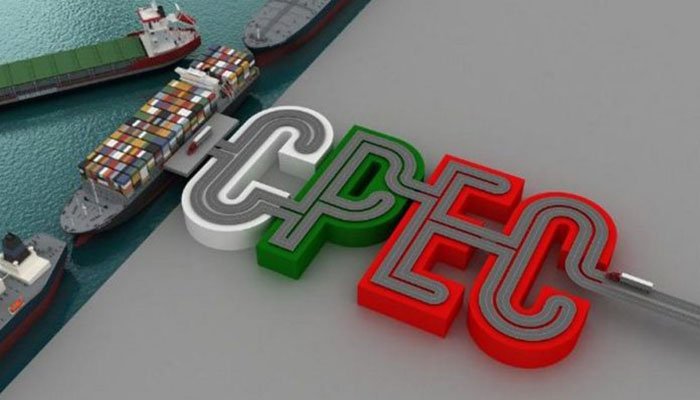Experts reach mutual consensus on facilitating investors in CPEC projects
During a webinar at the Sustainable Development Policy Institute (SDPI), mutual consensus was reached that the government should facilitate investors and the business community with regard to CPEC and APTTA to boost the national economy. Hassan Daud Butt, CEO KPBOIT was also present at the occasion who said that there should be continuation of economic policies, and the digitalization of the national economy. Chinese Consul General in Karachi, Li Bijian also said that Chinese companies had also partnered with Sindh government in upgrading transport system in Karachi, Hyderabad, Thatta and Sukkur. The meeting also discussed potential of Afghan Transit Trade.
ISLAMABAD/KARACHI: In order to tap full potential of China-Pakistan Economic Corridor (CPEC) and Afghanistan-Pakistan Transit Trade Agreement (APTTA) the divide between policymakers and stakeholders must be bridged over at the earliest.
This was the consensus of a roundtable of think-tanks from different sectors that stressed that the government should facilitate investors and the business community with regard to CPEC and APTTA to boost the national economy.
The meeting was set up by Sustainable Development Policy Institute (SDPI), a non-governmental organisation at Khyber Pakhtunkhwa Board of Investment and Trade (KPBOIT). The moot was attended by officials of chambers of commerce and industries, academicians, government officials, and media persons.
Addressing the meeting, Hassan Daud Butt, CEO KPBOIT, said there should be continuation of economic policies, digitalisation of the national economy and an archiving structure for informed decisions.
Butt said a research-based economic policy should be implemented in the country and for that universities and youth should be mobilised to research and suggest missing facilities and loopholes for the policymakers to address in the decisionmaking process.
Dr Khizar ur Zaman, Vice Chancellor University of Science and Technology, Bannu, called for setting priorities and developing linkages between universities and chambers to find new vistas of investment and trade.
Earlier, Dr Vaqar Ahmed, Joint Executive Director at SPDI, said, “Different districts of KP have different business potentials, some are being benefited from Afghan transit trade, some have vast potential accruing from mines and minerals sector, some are ready for livestock revolution,” he said.
Fazal Amin Shah, Deputy Collector KP Revenue Department, said the government had reduced the rate of different taxes in the province to facilitate entrepreneurs and investors and “it only introduces tax once in a year and no mini budget throughout the year”.
Adnan Jalil, an official of Peshawar Chamber of Small Traders and Industry, Haris Mufti, former Senior Vice President Sarhad Chamber of Commerce and Industry, and Abdul Qadoos Khan, an economic analyst, also shared their views on the occasion and highlighted various aspects of the topic.
Meanwhile, Li Bijian, Chinese Consul General in Karachi, speaking with journalists at his Consulate, said CPEC’s first phase was almost complete and now, with all seriousness, both partners were on the execution of second, which is centered on agriculture, manufacturing, and other areas.
“The second phase is focused on development and upgradation of infrastructure, and setting up energy generating projects including those of renewable energy,” said Bijian.
“CPEC, as a signature project under the Belt and Road Initiative, has served as a fine example as China and other Islamic countries work to synergise their development strategies.”
As an all-weather strategic cooperative partner, China always gives priority to its cooperation with Pakistan in its overall external cooperation, according to Bijian.
He said Joint Working Committees on CPEC had been pursuing these projects spread in many different areas of Pakistan.
All the projects under CPEC were progressing well; however, COVID-19 pandemic slowed down the process, he said.
Chinese consul general said in Sindh, under CPEC, China was a major partner in Dhabeji Special Economic Zone, Korangi Industrial Park, Coastal Development projects, Thar coal mine development, infrastructure development projects, and renewable energy in the province, he added.
Bijian said Chinese companies had also partnered with Sindh government in upgrading transport system in Karachi, Hyderabad, Thatta and Sukkur.
The companies would soon provide 150 buses to Sindh government under this move, the diplomat said.
He further said Chinese companies were engaged in manufacturing sector as well including in assembling of mobile phones and motorcycles, also in joint ventures.
Bijian appreciated the role of Pakistan government, Pakistan armed forces and other law enforcing agencies in providing security protection to the Chinese companies.
Chinese envoy Zhao Shiren urges students to uphold integrity and strengthen China-Pakistan ties
LAHORE:The Consul Generals from several countries and other distinguished guests attended …











